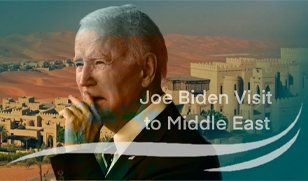 2022 / 17 / Jun
2022 / 17 / Jun
A reading of the dimensions and repercussions of the upcoming visit of US President Joe Biden to the Middle East
Dr. Haider Abed Kazem
Official American sources, foremost of which is the "White House", announced that US President Joe Biden will begin a tour in the Middle East, for the period from July 13-16, 2022, next, to each of (Israel), the West Bank, and the Kingdom of Saudi Arabia, and meet with the kings and princes of the Cooperation Council for the Arab States of the Gulf, as well as the leaders of the countries of Egypt, Jordan and Iraq, as Saudi Arabia will be the most important stop in the visit after "Israel", despite describing it as a "pariah" country during his presidential election campaign, due to the assassination of the Saudi dissident, "Jamal". Khashoggi, however, remains a strategic ally of the United States and plays a major role in global energy markets.
The schedule of the visit on its second day will include the US President attending a joint summit called by Saudi King Salman bin Abdulaziz of the leaders of the Cooperation Council for the Arab States of the Gulf, the King of the Hashemite Kingdom of Jordan, the President of the Arab Republic of Egypt, and the Prime Minister of the Republic of Iraq.
US foreign policy seeks at the current stage of resetting relations with Saudi Arabia as a strategic partner of the United States for nearly 80 years, and President Joe Biden, like his predecessors, considers Saudi Arabia an important partner and an important incubator for his priorities in the Middle East, as well as the important role played by Saudi Arabia in the OPEC Plus agreement, which includes 23 oil-exporting countries, as Saudi Arabia is one of the main exporters, and announced its intention to raise production by about (50%), this summer to prevent The fuel crisis has been exacerbated by the ongoing conflict between Ukraine and the Russian Federation as well as the increase in global demand for fuel after recovering from the effects of the Corona pandemic.
At the beginning of his visit to the region and while in Israel, President Biden will participate in a virtual meeting of leaders of the I2U2 Economic Security Forum, which was established in late 2021 and includes Israel, India, the United Arab Emirates, and the United States of America.
In their communication with Joe Biden's administration, Israeli officials have stressed that U.S. relations with Arab countries, including Saudi Arabia, are essential to Israel's security and overall stability in the region. The upcoming visit could provide an opportunity to begin talks on what the administration sees as a long-term project to normalize Israeli-Saudi relations.
Prime Minister Naftali Bennett stated that the visit "will reveal the steps the United States is taking to integrate Israel into the Middle East and increase the prosperity of the entire region." Coinciding with the signing of the memorandum of tripartite agreement between (the European Union - Egypt - "Israel") marked at the Eastern Mediterranean Gas Forum, in the Egyptian capital, Cairo, on 16-6-2022, which allows "Israel" to export gas to Europe through Egypt for a period of 3 years, extendable.
In the meantime, the Palestinians will look for progress in reopening the U.S. consulate in Jerusalem.
Hussein al-Sheikh, a senior aide to Palestinian President Mahmoud Abbas, told The Associated Press that the Palestinians welcome Biden's visit and hope it will bring them "positive results" but feel helpless in their decades-long quest for an independent state alongside Israel.
Palestinians also hope the Biden administration will make greater efforts to rein in Israeli settlement construction and other unilateral actions that they say impede a final revival of the long-stalled peace process.
- Our comment on the first axis of the visit to Israel and the West Bank:
· Trying to proceed through diplomacy to end the conflict between Hamas and Israel and reactivate peace negotiations between the two sides.
· The US president will also focus on Israel's integration into the region through the Abraham Accords of August 13, 2020, which include the UAE, Morocco and Bahrain, and "America will work to get its partners to work together to achieve a more prosperous Middle East."
· The US administration has worked with Congress to provide a billion dollars to renovate the Iron Dome in Israel, after the recent conflict and attacks on Israeli settlements, and to undermine the threat of Iran and its allies in the region.
· Economically, work to employ the huge gas fields recently discovered in the Eastern Mediterranean and transport them via pipeline to Egypt through the north of the
The Sinai Island, and work on the construction of another pipeline across the two countries in a short period of time to raise the increase in supply between the two countries between 3-5 billion cubic meters, and then export the surplus of the Egyptian need to Europe and Asia, and this strengthens Israel's position to make it a major energy center in the Eastern Mediterranean.
- As for the second axis of the visit
Related to the Kingdom of Saudi Arabia and the meeting with the Saudi King and Crown Prince "Mohammed bin Salman" After the decline in the relationship between the new US administration represented by President Biden, the most important event in early 2022, (the Russian-Ukrainian invasion), and its effects on the global rise in energy prices, and the threat in the growing nuclear file from Iran, which did not reach the desired solution by the Biden administration, all of this destabilized the global calculus and integration.
Now Biden has decided that it is necessary to return to strengthening ties with America's most prominent ally in the Middle East, Saudi Arabia.
The Biden administration, led by the White House coordinator for the Middle East, Brett McGurk, is working with Israel and Saudi Arabia to broker a set of joint economic and security agreements, as America seeks to unfreeze relations between the two countries under which Saudi Arabia does not officially recognize Israel, and the two countries do not have official declared diplomatic relations. The supposed agreements would allow commercial flights from Israel to fly over Saudi airspace, and a separate agreement could solve an ongoing problem over two strategically located islands (Tiran and Sanafir) in the Red Sea, turning them into Saudi control.
The United States is also working with Saudi Arabia to extend the ceasefire in Yemen, where a Saudi-led war has raged years ago against Yemen. In a statement issued after the truce was extended, Biden praised Saudi Arabia's "courageous leadership."
Finally, the two sides are expected to discuss the concerns arising from Iran's progress on its nuclear file and uranium enrichment, as well as working to limit its influence and reduce its vital space in the region and neighboring countries.
- Obstacles that may face the visit to the Kingdom of Saudi Arabia:
· Rejection by the Democratic team of supporters of freedom, justice and human rights, especially on the issue of the murder of Saudi journalist "Jamal Khashoggi" and the lack of resolution of the issue between the parties to the case, and how to overlook this behavior of excluding opponents of the authority inside and outside Saudi Arabia.
· Saudi Arabia's role in the rise of al-Qaeda and the terrorist attacks of September 11, 2001. Reports suggest that accountability for the events of September 11 should be prioritized in any conversations between members of the Biden administration and Saudi officials, including with the current crown prince or any other members of the Saudi royal family. The organization of the families of the victims of September 11 condemns the visit, while praising the historic executive order it signed and requested for US intelligence agencies to conduct a review of the declassification of thousands of investigative documents related to Saudi support for al-Qaeda and the September 11 attacks, which led to the emergence of public documents for the first time revealing that Saudi officials and intelligence agents were in contact with the kidnappers and provided material support to them, and that the American people know that the Kingdom has a moral responsibility. and legal about the events of September 11, and that Saudi guilty people have never been held accountable.
- As for the second part of the second axis of the visit, which is President Biden's meeting with the leaders of the Gulf Cooperation Council, and the other three countries outside the aforementioned grouping (Iraq, Egypt and Jordan).
· During this meeting, Biden can affirm the United States' commitment to the security of partners and defend them against threats coming from some regional actors in the region, according to the US president's close circle responsible for the visit, as well as discussing economic affairs and Iraq's role in the global energy market, as it is an important actor and can have a clear impact on the balances of the global energy supply, by providing the appropriate political and security conditions.
· Some circles close to the media department of the Biden administration are discussing the possibility of establishing a military grouping or alliance (Arab NATO), which includes a group of Gulf Arab countries, Iraq, Jordan and Egypt, with the aim of joint cooperation to combat terrorism represented by (ISIS) in the region, as well as undermining Iran's foreign policy and limiting its influence, and interventions, which enable it to maneuver and pressure on the nuclear file using those files related to expanding its vital field, which is the same project that was proposed in the previous US administration under the president. "Donald Trump" 2017-2021, and reducing the weight of those consequences for the US administration and handing them over to allies in the region.
· It is possible that after the visit, we will witness the establishment of the nucleus of a regional economic and security system that will be the gateway to the formation of the Greater Middle East according to the American vision.

Dr.. Haider Abdul Kazem